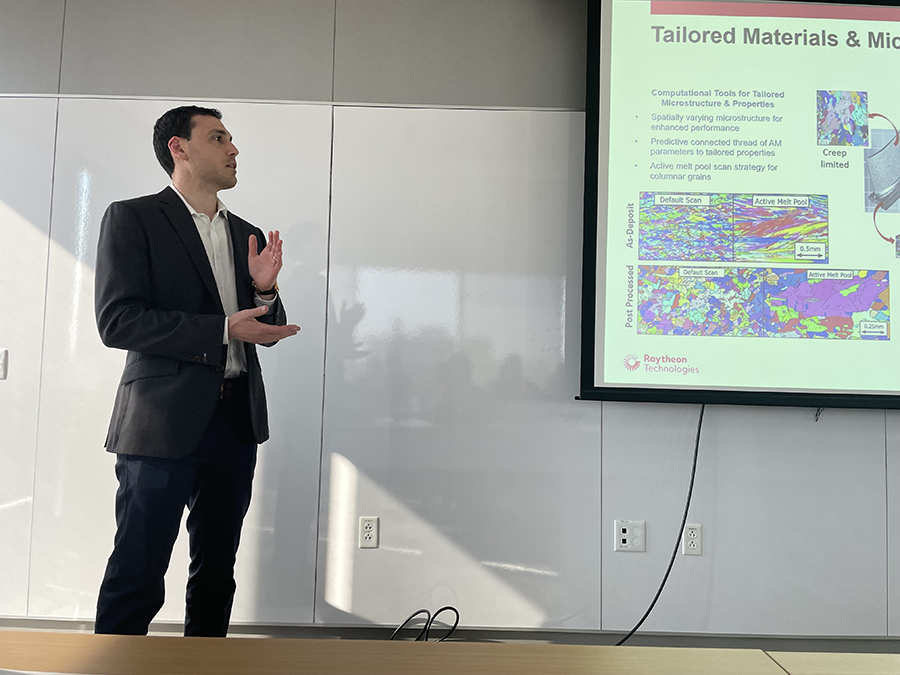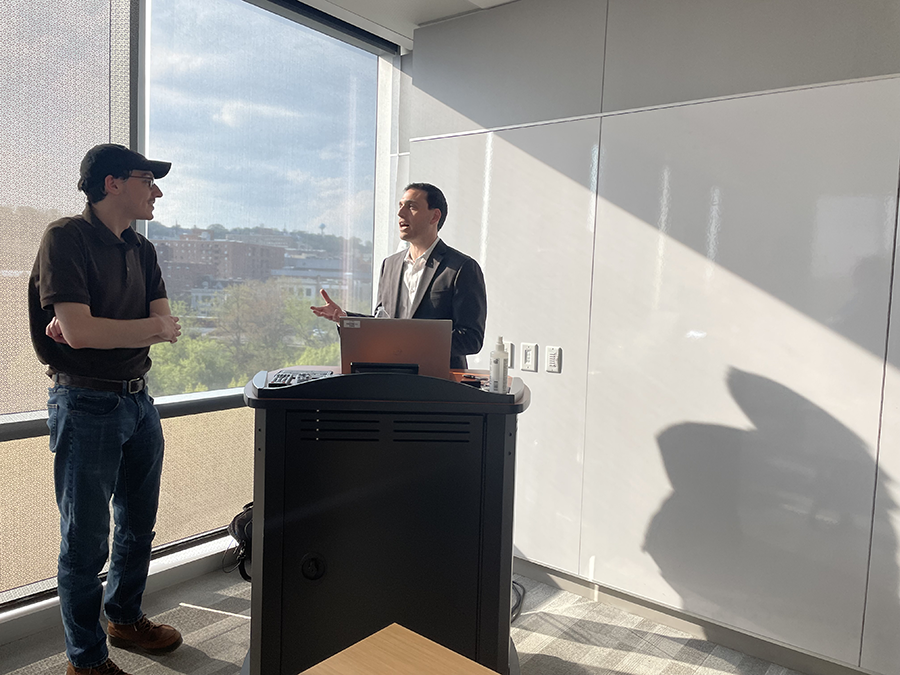Accelerating adoption of additive manufacturing
Engineering alumnus Brian Fisher is a strong link between top industry and academic researchers working in 3D printing technologies.
At Carnegie Mellon, where both the Manufacturing Futures Institute and the Next Manufacturing Center conduct groundbreaking research in advanced manufacturing, it is no surprise that dozens of students and faculty turned out to hear how a major aerospace manufacturer is utilizing additive manufacturing (AM) technology.
Brian Fisher is a senior principal additive manufacturing engineer at the Raytheon Technologies Research Center (RTRC) and a former Ph.D. student of Jack Beuth, a professor of mechanical engineering and faculty co-director of the Next Manufacturing Center.
Fisher came to the Carnegie Mellon campus in April to meet with faculty and students to nurture the relationship that the university has with Raytheon Technologies, the world’s largest aerospace and defense company.
During his presentation, Accelerating Adoption of Additive Manufacturing in Aerospace & Defense, Fisher appeared to enjoy teaching a room full of his former professors.
While a lot of the concepts that I discussed were not new to the audience, Raytheon Technologies has some unique approaches, and I gave them a perspective on the relevance and application of technical advances in aerospace parts manufacturing.
Brian Fisher (MechE ’18), Senior Principal Additive Manufacturing Engineer, Raytheon Technologies
“While a lot of the concepts that I discussed were not new to the audience, Raytheon Technologies has some unique approaches, and I gave them a perspective on the relevance and application of technical advances in aerospace parts manufacturing,” said Fisher.
Advanced manufacturing technologies like AM have the potential to dramatically lower costs and increase production for a company like Raytheon Technologies that works in both aerospace and defense, so effective partnerships between industry and academic researchers are more than just mutually beneficial, their work has serious implications for both economic prosperity and national security.
The AM group at RTRC is focused on optimizing design to improve performance and minimize cost, drive variability out of the process, and accelerate certification activities across Raytheon Technologies. To accomplish this, they study many of the same AM process parameters as Carnegie Mellon researchers.
“The AM work at CMU is well aligned with what industry needs,” said Fisher, who says he knows that CMU is doing good work and has comparable capabilities to RTRC, the central innovation hub for Raytheon Technologies’ business units.
Beuth believes Carnegie Mellon is the leading producer of academic additive manufacturing research because of both the breadth of activity and depth of expertise in AM and AI throughout the university.
“No other university has as many faculty working on funded AM projects. We currently have at least 30 faculty members working on AM research,” said Beuth.
Carnegie Mellon engineers were early AM adopters who now have a tremendous amount of experience and study a diverse range of AM issues—covering nearly all, if not all, primary AM research topics according to Beuth.
Fisher applied to Carnegie Mellon in 2014 after having earned his bachelor’s degree at Brown University in 2010 and working several years on mechatronic systems for more efficient algae production.
When he arrived at CMU, he didn’t know much about metals AM, which at the time was still mostly being used for rapid prototyping. It was Beuth who sparked his interest and recruited him into the AM program. He was attracted to the technology because it is a more efficient way to produce parts for end use.
Jack really sold me on the vision for the future of AM that is now coming to fruition.
Brian Fisher (MechE ’18), Senior Principal Additive Manufacturing Engineer, Raytheon Technologies
“Jack really sold me on the vision for the future of AM that is now coming to fruition,” said Fisher.
Since earning his Ph.D. in mechanical engineering in 2018, Fisher has seen firsthand how AM has advanced.
“There’s a definite focus on industrialization now. We’ve moved past prototyping because we have a better understanding of the processes and can produce better quality parts. The industry has matured, but there is still exciting work to be done,” said Fisher.
“What I really like is being able to dive deep into problems and apply an academic understanding of the physics of the process to developing parts for actual production,” said Fisher.
He says that his studies and research work at CMU is directly relevant to his work today and that from day one on the job he was able to contribute.
Beuth is not surprised by Fisher’s success. He says additive manufacturing is an excellent field to be working in because there is a ferocious demand for it.
Carnegie Mellon engineers are uniquely qualified to work together to apply AI to improving the design and material characterization of 3D printed parts.
Jack Beuth, Professor, Mechanical Engineering
“Every company that makes metal parts is either actively adopting and expanding AM or tracking it for near future adoption,” said Beuth.
The former student and his professor agree on the evolving vision for the future of AM.
Fisher says that there will be a continued focus on driving down costs and reducing variability in the near to mid-term, with a growing focus on larger print volumes, faster build rates, and more automated fault detection and mitigation. He says that artificial intelligence will continue to drive innovation in this space because as you move to larger parts and higher production rates, there will be a greater need to understand complex defect mechanisms. And the ability to rapidly utilize information from one machine and apply it to another will be critical.
Beuth also believes that artificial intelligence will be key to advancing widespread adoption of additive manufacturing.
AI offers tremendous cost and time savings in the production of metal parts, particularly those with complex geometries that are produced in low volumes with high safety standards.
Beuth says there is an exceptional degree of machine learning expertise in the College of Engineering and throughout Carnegie Mellon that can be used to support industry.
He says, “Carnegie Mellon engineers are uniquely qualified to work together to apply AI to improving the design and material characterization of 3D printed parts and develop process monitoring and control methods that are needed to qualify and certify parts for safety critical applications.”


